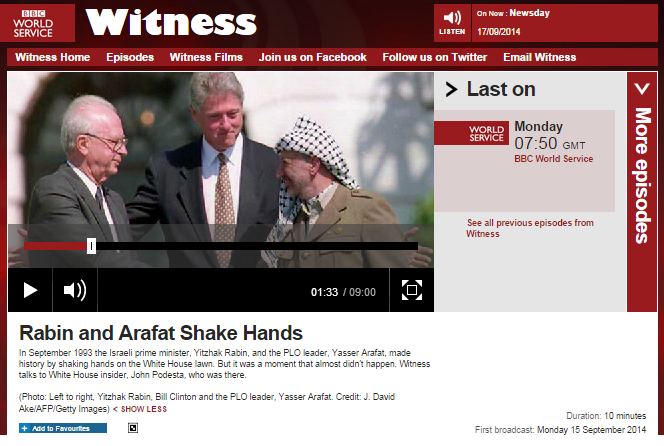On September 15th the BBC World Service radio programme ‘Witness’ broadcast an episode titled “Rabin and Arafat Shake Hands” pertaining to the signing of the Oslo Accords in September 1993.
Presenter Louise Hidalgo set the scene thus:
“This was going to be a truly historic moment. These two bitter adversaries – Yitzhak Rabin the army general turned prime minister and Yasser Arafat the guerilla leader – standing side by side to witness the signing of the first agreement between the Israelis and the Palestinians.” [emphasis added]
The Oxford Dictionary defines ‘guerilla’ as follows:
“A member of a small independent group taking part in irregular fighting, typically against larger regular forces.”
Fatah and the PLO – both led by Arafat –at no point confined their activities to fighting the Israeli army.
In a paper published in 2010, Dr Boaz Ganor wrote the following in the chapter titled “Guerrilla Warfare vs. Terrorism”:
“Ehud Sprinzak sums up this approach as follows: “Guerrilla war is a small war – subject to the same rules that apply to big wars, and on this it differs from terrorism.” David Rapaport adds: “The traditional distinguishing characteristic of the terrorist was his explicit refusal to accept the conventional moral limits which defined military and guerrilla action.”
As opposed to Laqueur, Paul Wilkinson distinguishes between terrorism and guerrilla warfare by stressing another aspect–harm to civilians:
Guerrillas may fight with small numbers and often inadequate weaponry, but they can and often do fight according to conventions of war, taking and exchanging prisoners and respecting the rights of non-combatants. Terrorists place no limits on means employed and frequently resort to widespread assassination, the waging of ‘general terror’ upon the indigenous civilian population.
The proposed definition, as noted, distinguishes terrorism from guerrilla activity according to the intended target of attack. The definition states that if an attack deliberately targets civilians, then that attack will be considered a terrorist attack, whereas, if it targets military or security personnel then it will be considered a guerrilla attack. It all depends on who the intended victims are. First and foremost, this definition is meant to answer the need for analyzing and classifying specific events as “terrorism” or “guerrilla activities.” “
As is well known, under Arafat’s leadership, the PLO carried out thousands of attacks on civilians over the decades and the organisation was designated a foreign terrorist organization by his White House hosts until the Oslo Accords. In the eleven years between the signing of those agreements and Arafat’s death, the Fatah faction he also led continued to carry out terror attacks which deliberately targeted Israeli civilians.
But, as Dr Ganor also notes:
“Terrorism and guerrilla warfare often serve as alternative designations of the same phenomenon. The term “terrorism,” however, has a far more negative connotation, seemingly requiring one to take a stand, whereas the term “guerrilla warfare” is perceived as neutral and carries a more positive connotation.”
The BBC’s apparent wish to present “a more positive connotation” by means of use of the term “guerilla leader” does not in this case meet BBC editorial guidelines on accuracy.




